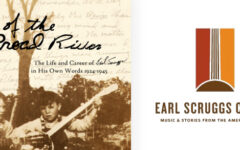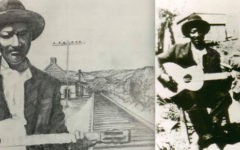
The IBMA Foundation, the philanthropic arm of the International Bluegrass Music Association, has announced that the recipient of their 2019 Rosenberg Bluegrass Scholarship Award will be Jordan Laney, Presidential Pathway Postdoctoral Fellow in the Department of Religion and Culture at Virginia Tech in Blacksburg, Virginia. She receives a cash grant of $500, and will be invited to present at the academic conference held in conjunction with the IBMA Business Conference in Raleigh, NC in September.
Each year the organization presents this award to the developing academic scholar who they feel has presented the best paper on an aspect of bluegrass music at a juried academic conference. It is named in honor of bluegrass historian and academician Neil Rosenberg, a 2014 inductee into the Bluegrass Music Hall of Fame.
According to the Foundation…
The objective of this award is to grow the academic awareness of bluegrass music by encouraging developing academic scholars to present research of high quality to fellow scholars on any aspect of the genre. Developing academic scholars eligible for this award are defined as graduate students in MA or PhD programs and recent PhDs (within five years of degree completion).
Laney’s paper that took the prize is entitled: “Rehistoricization and Performance: a Methodological Approach to (Re) Creating the Bluegrass Genre.” It was presented at the Cultural Studies Association Conference at Tulane University in New Orleans, LA over the May 30-June 1 weekend. It examines Carlton Haney’s iconic “Bluegrass Story” from a feminist perspective.
She describes the paper thusly…
“This paper discusses the methodological findings of my dissertation in which I focus on “the Story,” a staged event curated by folklorist Ralph Rinzler, and a narrative that quickly became the history of bluegrass music. I argue that the quick adoption of a single story highlighted the roles of men and arguably veiled the influence of women and people of color within the genre. Interested in utilizing alternative conceptual approaches to uncover marginalized stories, I combine archival, reflexive interviews, ethnographic, participant observation, and survey methods to disrupt traditional narratives. Specifically, my paper not only asks how bluegrass music festivals began, for whom, and to what end, but focuses on research methods and power structures within the community, reflecting on how histories are created. Attention is focused on the construction of the narrative to allow greater insight into the social desires, political needs, and economic trends of the bluegrass community across time.
This historical aspect of the study is combined with my fieldwork which spans the time period of 2014-2017. This longitudinal study leads me to grapple with the narratives we re-create through scholarly processes of collecting, translating, performing, and archiving shared narratives. It is my assertion that methodological choices often fail to explore the borders between disciplines and communities and the power of methodology. The result is that methods for researching traditional music communities often fail to utilize the same level of criticality as our questions demand. Methods provide the maps for our inquiries and impact. My exploration of a dominant story, the story, through multiple, hidden stories, allows for a narrative shift from the margins to the center, to borrow a phrase from bell hooks. This reflective re-visiting of methods is, I posit, a promising arena of new knowledge in bluegrass scholarship.”
Laney not only studies and writes about bluegrass music, she has it in her blood. Her family have long been bluegrass performers, including her uncle Glenn Laney who was a member of The Knoxville Grass, and brother Colby Laney, formerly with Volume Five and the Larry Stephenson Band.
The 2019 selection committee for the Rosenberg Bluegrass Scholarship Award was chaired by Dr. Travis Stimeling of the University of West Virginia, with input from Dr. Kristine McCusker of Middle Tennessee State University, and Tim Stafford of East Tennessee State University and Blue Highway.
The mission of the IBMA Foundation is to bundle individual and association donations and direct them to non-profit organizations that support and foster bluegrass music-related arts and culture, education, literary work, and historic preservation. They depend on these donations for their annual grants. More details can be found online.
Mary Tyler Doub of the Grey Fox Bluegrass Festival was the sponsor for the 2019 Award. She has been an active member of the bluegrass community and the IBMA since the beginning, and received the organization’s Distinguished Achievement Award in 1997.
Congratulations to Dr. Laney, and many thanks to the IBMA Foundation for the terrific work they do.







